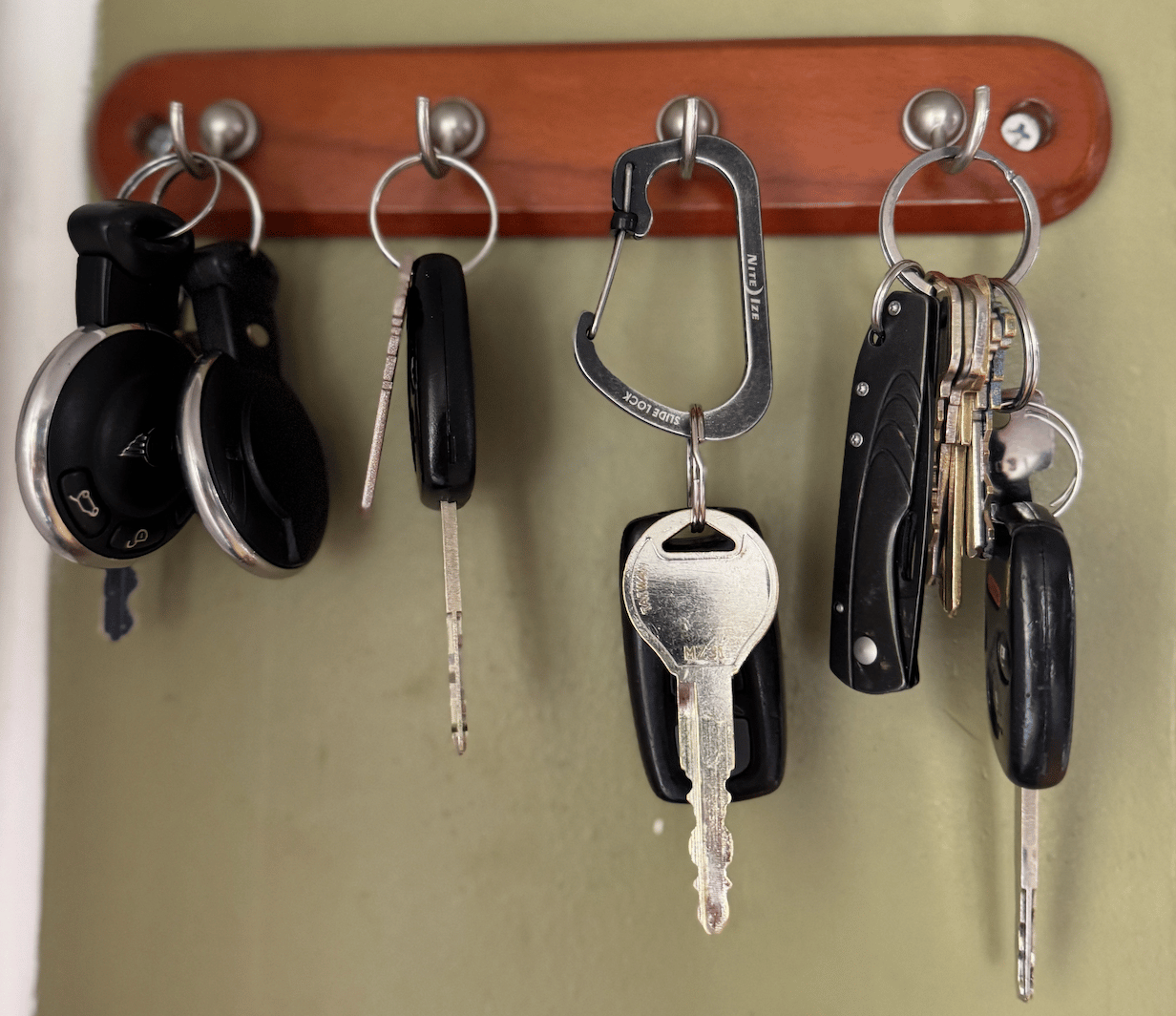Where the Hell Are My Keys?
How to Build Systems That Actually Work (Without Overthinking It)
There's nothing more stressful than not being able to find your keys.
OK, that's patently false. I have to believe that diffusing a bomb or performing open-heart surgery is WAY more stressful, but still. When you're late and your keys are nowhere to be found, it causes real anxiety.
After one too many mornings of me spiraling around the house, muttering accusations at thin air, my wife had enough. She bought a key hook and screwed it into the wall by the door.
"When you come home," she said, "your keys go here."
It took a little getting used to. We had to train ourselves (OK, she had to train me). Instead of leaving them in my pocket, or on the table, or the floor, or God knows where, I had to start hanging them on the hook.
Over time, it stuck. The keys are where they're supposed to be. No more panic.
When both kids went off to college, one of the things we got them was a key hook. That way, when they come and go, they can hang their keys by their door, too.
This may not sound revolutionary. Lots of people have a place for their keys. But it illustrates something bigger: the power of a system. As James Clear puts it in Atomic Habits:
We don't rise to the level of our goals. We fall to the level of our systems.
So this week, let's talk about systems: those invisible frameworks that quietly run our lives, how systems don’t have to be overly complex, and why building your own might be the most important thing you do this year.
The Invisible Architecture of Success
Let's start with this: a system is just a structure that helps something happen more easily. That's it. It's not fancy or complicated. It's just a repeatable way of doing things that makes life run a little smoother.
And I'll let you in on a secret: you already have systems. Lots of them.
The way you make your coffee in the morning? That's a system. How you wind down before bed? System. How you pay your bills, the route you take to work, where your phone charges at night? All systems.
They're mostly invisible, running in the background. You may not even think of them as systems, but they shape your day in meaningful ways.
So the real question isn't "Do I have systems?" It's "Are my systems helping me, or just happening to me?"
Which brings us to goals. I wrote a bit about this a while back, but in a nutshell: a goal is something you want. A system is how you actually get there.
A goal says, "I want to get up earlier." A system says, "Here's exactly how I'll make that happen, every single day."
One is a wish. The other is a blueprint.
And if you're wondering how systems differ from habits, here's the simplest way to think about it: habits are individual actions; systems are the structure that makes those actions consistent. A habit is brushing your teeth. A system is the routine that ensures it happens—same time, same place, every day.
If something in your life feels consistently chaotic, like say your mornings, your inbox, your kitchen, it might not be a motivation problem. It might be a systems problem. Either you don’t really have one, or the one you have isn’t working.
The first step isn't to set a better goal. It's to look around and examine the invisible architecture already shaping your life. Once you see it, you can start building something better.
Because the truth is, you're going to have systems whether you design them or not. The only question is: will they be intentional or accidental?
Me and My Amazing Alarm Clocks
Last week I wrote about motivation—specifically, the absurd number of alarm-related interventions I'm putting in place to try to become a morning person. At some point in the last week, I realized: oh. I didn't just try to get up earlier. I built a system.
Unintentionally. But still.
Allow me to elucidate. (And yes, I do have a word-of-the-day app on my phone. What makes you ask?)
My goal was pretty basic: get out of bed by 7:00 AM. Not hit snooze over and over. Not roll out of bed at 7:42 in mild shame. Actually up, actually moving. But setting that as a goal wasn't enough. I had to have a plan. You get it, you read last week's piece.
To recap, here's what I ended up with:
Two different alarms on my phone, staggered so I don't get too cozy.
A fancy new alarm clock across the room that doubles as a sound machine and nightlight because…you know…monsters hate nightlights.
Stretch and drink water right after getting up, before my brain has a chance to make excuses.
Nothing here is groundbreaking. But the system works, not because it's fancy, but because it's consistent. It removes just enough friction and adds just enough momentum to make the goal happen.
And that, my friends, is kinda the point: systems don't have to be complicated. They just have to work together.
We tend to think systems are something you design with intention—whiteboard, strategy session, a team of engineers, the whole shebang. But some of the most effective ones come from repeated behavior, tiny tweaks, and moments of frustration. Systems often start when you're just trying to make life a little easier.
So if you've ever succeeded at something without quite knowing how, it probably wasn't magic. It was a system. Even if you didn't call it that.
But once you do start to see those patterns, you can stop leaving them to chance and start building them on purpose.
Building Your Own Life Operating System
Here's the underrated thing about systems: you don't need to overhaul your entire life. In fact, please don't. Find one spot where life feels harder than it should and start there.
For me, right now, it's physical therapy.
A while back I tore my rotator cuff. My wife and I fell down the side of a mountain while riding an ATV…safety third! Anyway, I have daily exercises I'm supposed to do. They're not hard. They don't take long. And yet, I don't do them consistently.
What I need isn't more motivation. I need a system.
So here's what I'm going to try this week:
Put a resistance band on top of my shiny, new, annoying alarm clock.
Do some light weight exercises right after brushing my teeth.
Leave a second band downstairs by the couch, so if we're watching TV at night, I can get in one more round while watching Andor.
Nothing fancy. Just trying to make it easy, obvious, and hard to ignore. I'll let you know next week how it goes. But I'm willing to bet that making it automatic beats relying on willpower.
Because the anatomy of any good system is actually pretty simple:
It's obvious. You can't miss it. Like a resistance band on the annoying buzzing machine.
It's easy. Low friction. No superhuman willpower required.
It's repeatable. It works whether you're motivated or exhausted.
Pro tip: Anchor your new system to something that already happens. After I brush my teeth, I do my exercises. When I sit down for TV, I grab the resistance band. After X, I do Y. Your brain loves these little chains.
Make it visible. Make it satisfying. These repeatable patterns matter.
And don't worry if your systems change: they're supposed to evolve. Your life changes, your system adapts. We now have two rows of key hooks plus hooks for the leashes of all four of our dang dogs.
Systems compound over time, like interest for your life. Each small system makes the next one easier to implement. Before you know it, you've built something bigger: your own personal operating system.
That's the real impact of systems. They turn your good intentions into default behavior through the quiet accumulation of countless small wins.
The Bottom Line
The truth is, systems aren't sexy. No one's putting their key hook on Instagram. But while others burn out chasing big goals, people with solid systems just keep moving forward. Quietly, consistently, almost effortlessly.
That’s because systems are infrastructure. They work every day, regardless of how you feel. One good system can reshape your entire year. Build the right systems now, and a year from today you won't just have achieved a goal. You'll be living a fundamentally different life. Not because you tried harder, but because you built smarter.
So start with one thing that feels harder than it should. Design a simple system that makes it easier. Make it obvious. Make it repeatable. Make it so simple you can't not do it.
Because if you want lasting change, you don’t need more discipline. You just need to know where your keys go.
Oh and next week, we’ll explore the tools that help systems stick. How the right objects, apps, or tiny upgrades can turn good intentions into daily defaults.
Ever forward.
— Derek (aka Chief Rabbit)
Enjoying Chief Rabbit?
This newsletter is free and always will be. But if you’d like to support this work, you can. You’ll get monthly Q&As, vote on topics, stickers, and help keep this ad-free.
You can also follow me on Threads where I sound off on all sorts of nonsense OR LinkedIn where I tend to be a touch more serious.
Also, thanks for being someone who reads to the bottom of the page, you’re a special human.




